Rethinking Business Travel in Germany 2025
A proven framework to plan, launch, and scale your travel and expense management solution.

A Market at a Crossroads
Insights from the 23rd VDR Business Travel Analysis
German business travel has entered a new era. In 2025, the industry finds itself at a crossroads, where old patterns of frequent, routine trips are giving way to something more intentional. Out of this transition, a new reality of corporate mobility is emerging, which is defined by purpose, selectivity, and strategy. Every journey is now expected to deliver impact, whether by sparking innovation, strengthening international partnerships, or reinforcing trust in a time of uncertainty.
The VDR Business Travel Analysis 2025, published by the Verband Deutsches Reisemanagement (VDR or German Business Travel Association), captures this pivotal shift. With more than 600 member companies, VDR is Germany’s largest network for corporate or mobility management. For more than five decades, VDR has been the trusted voice of the industry, equipping organisations with benchmarks, expertise, and advocacy.
The 23rd VDR Business Travel Analysis report confirms what many finance and travel leaders already know: that German business travel is no longer chasing pre-pandemic benchmarks, but recalibrating toward smarter, leaner, and more strategic practices.
The numbers speak for themselves. In 2024, the number of business trips fell by 8% to 107.1 million. Yet spending rose to €47.2 billion, pushing the average cost per trip up by 7% to €439. This shift highlights a powerful truth: German companies are not travelling less out of necessity, but travelling smarter out of strategy. Each journey is becoming more purposeful, selective, and business-critical.
Four themes stand out in this new era of business travel:
- Global engagement is rising: International trips now account for 35% of all journeys, up from 26% just two years ago.
- Sustainability is a driver, not a discussion: 82% of companies are willing to extend domestic travel by train by three hours to reduce carbon impact.
- Technology, especially AI, is reshaping travel management: Adoption is expected to nearly double by 2026, unlocking automation, compliance, and predictive insights.
- Safety and duty of care have become central to corporate responsibility: 92% of companies are prioritising travel security more than ever before.
This evolution reflects a broader transformation in how German companies view travel. What was once a back-office function is now a strategic lever for growth, sustainability, and resilience.
At Emburse, we see this shift as confirmation of what our brand has always stood for: finance teams should not just reconcile the past, but confidently shape the future. Expense Intelligence™, our intelligent infrastructure for finance, equips leaders with real-time visibility, predictive automation, and embedded compliance so that every business trip delivers both financial return and human value.
As the VDR report describes, this market is "not at its destination, but clearly on course"—a “Landkarte voller Möglichkeiten” (map full of possibilities). In this eBook, we’ll explore those possibilities, offering fresh, practical insights for finance and travel leaders to navigate the balance between efficiency, sustainability, and human connection in the next chapter of German business travel.
Why German Companies Travel Less, but Achieve More
In 2025, business travel in Germany is no longer about frequency, but focus. The VDR Business Travel Analysis reveals that trips are being deployed strategically, with companies asking: Why this trip? What outcome will it deliver? This underscores businesses’ commitment to maximising return on investment for every business trip and minimising wastage.
The data shows a clear shift: while total trips dropped by 8% in 2024 to 107.1 million, the average cost per trip rose 7% to €439. Companies are not cutting back on travel entirely; they’re simply prioritising the trips that matter most.

One of the most striking shifts is the resurgence of international travel. In 2024, 35% of German business trips were abroad—a sharp increase from just 26% two years earlier.
Amid geopolitical and economic uncertainty, companies are favouring destinations that feel closer, safer, and more predictable. This explains the strong rise in European travel, where geographic proximity, political stability, and reliable regulatory frameworks give German businesses the confidence to strengthen relationships in person.
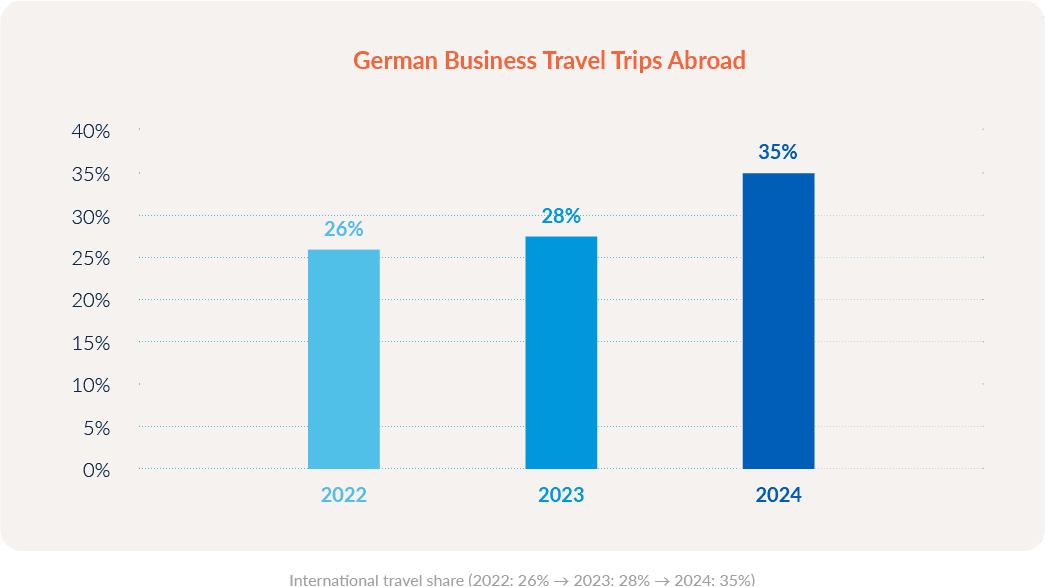
International travel share (2022: 26% → 2023: 28% → 2024: 35%).
While most of this growth is concentrated within Europe, the broader signal is clear: companies are prioritising global engagement once again.
Why? Because personal presence is increasingly seen as a strategic success factor. Face-to-face interaction is essential for:
- Building customer trust: In a world of remote calls and digital transactions, in-person meetings humanise the business relationship, accelerating deal cycles and increasing client confidence in the long term.
- Developing new markets: Expanding into new geographies often requires navigating cultural nuances, regulations, and local partnerships. Physical presence demonstrates commitment and helps companies avoid costly missteps.
- Maintaining global partnerships: For multinational collaborations, personal presence strengthens alignment, prevents miscommunication, and builds the kind of long-term trust that virtual tools alone can’t achieve.
This sentiment was echoed in a global study of 9,000 business professionals by international hospitality group Accor, where 85% of business professionals believed that prioritising in-person meetings would significantly boost their revenue by 36% on average.
The Accor study also found that business travellers preferred in-person meetings for critical situations such as closing a deal (74%) and contract negotiations (70%). This highlights the importance of human connection in building trust and finalising business agreements, in driving revenue growth for businesses worldwide.
As one VDR source puts it:
“”Trust is only built to a limited extent via screen.
VDR
This new purpose of travel is not about volume, but about impact. It’s about combining meetings, optimising routes, and ensuring that when employees do travel, the result is stronger relationships, accelerated deals, or breakthrough collaboration.
For finance leaders, this requires a new mindset: business travel as a strategic investment, not overhead. And with tools like Emburse Expense Intelligence, leaders can track not only the cost of a trip, but also the value it delivers—turning spend into measurable strategy.
How SMEs and Large Enterprises Travel Differently in 2025
Not all German companies are navigating business travel the same way. The VDR Business Travel Analysis 2025 highlights a sharp contrast between resource-sensitive SMEs and globally anchored enterprises. Both groups are redefining their travel strategies—but in very different ways.
The overall decline in German business trips is almost entirely driven by SMEs, which are more directly exposed to shifts in market conditions than larger enterprises. Their travel volumes dropped from 93.3 million in 2023 to 83.7 million in 2024. By contrast, larger enterprises maintained a stable 23.4 million trips.
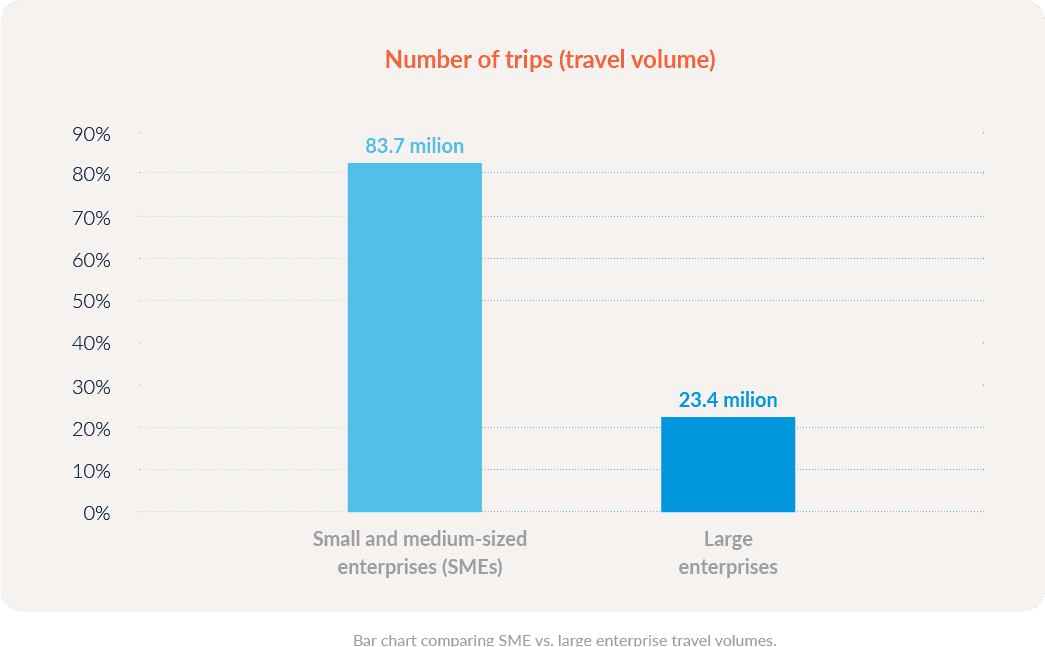
Bar chart comparing SME vs. large enterprise travel volumes.
But here’s the twist: while SMEs are travelling less, they are spending more per trip. Their strategy is to reserve travel for “business-critical occasions”—moments that directly impact revenue, customer relationships, or market entry. Rising market prices also play a role, but the underlying signal is that SMEs are becoming more selective, not passive.
Larger companies, meanwhile, are proving more resilient. With global teams and long-term commitments, they are absorbing higher costs to maintain stable travel activity. For them, stability in travel is essential for international presence, innovation pipelines, and sustained growth.
This dual reality reveals an important truth: success isn’t about how many trips a company takes, but whether the right trips are being taken. SMEs demonstrate that even under tighter budgets, companies can achieve impact by prioritising strategically. Large enterprises highlight the role of travel as an ongoing, non-negotiable driver of global operations.
For finance leaders across both segments, the opportunity is the same: choose an expense solution like Emburse and its Expense Intelligence approach to orchestrate spend in real time, optimise routes, and ensure that every trip is aligned with purpose and ROI. When every trip carries greater weight, compliance and visibility become essential. Emburse’s intelligent solutions are built to help firms enforce travel policies seamlessly, reduce waste, and safeguard budgets without adding administrative burden.
No matter your size, Emburse helps transform trips into strategy. Learn how SMEs and global enterprises use Expense Intelligence to optimise spend.
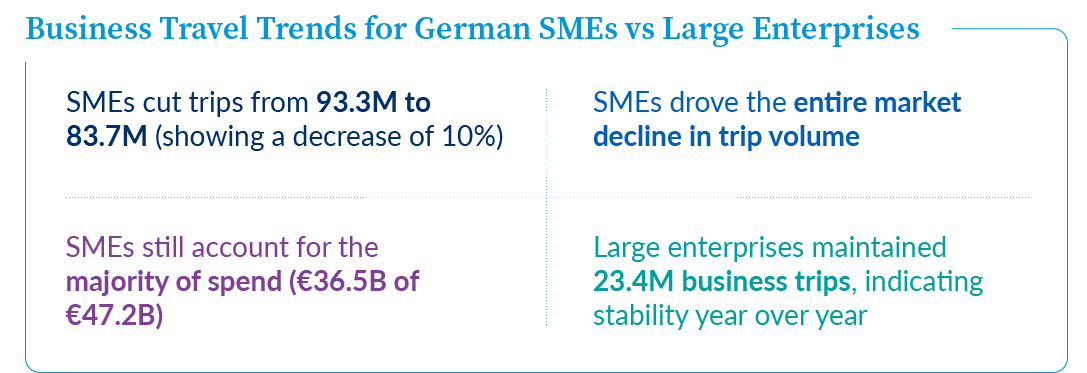
How German Companies Balance Sustainability and Spend
Sustainability is no longer a buzzword in business travel. It’s a strategic driver, shaping policies, budgets, and even employees' cultural expectations. The VDR Business Travel Analysis 2025 confirms that German companies are embedding climate and social goals into their travel strategies. However, they’re also confronting the financial reality of greener choices.
In 2024, nearly two-thirds of German companies (63%) promoted rail travel over flights, with projections climbing to 69% by 2026. What stands out is the willingness to adapt: 82% of companies are open to extending journeys by up to three extra hours by train, and more than a third would even accept four. Meanwhile, companies are also embracing electric vehicle usage in business travel (46% in 2024, rising to 74% by 2026). Business travellers’ openness to alternative transportation options could be attributed to Europe’s well-developed existing rail network and EV charging infrastructure.
This isn’t just about going green; it’s about credibility. Sustainability is now inseparable from brand reputation, employee well-being, and regulatory compliance. New regulations, such as the Corporate Sustainability Reporting Directive (CSRD), require EU businesses to disclose their environmental and social impact, while the European Green Deal mandates airlines and cruise operators to publish detailed emissions data.
Yet the report reveals a green paradox: while ecological sustainability is accelerating, it often comes at a cost. Sustainable Aviation Fuel (SAF), for example, is gaining traction but remains far more expensive and limited in supply. Likewise, greener ground transport options can translate into longer travel times and higher fares.
Beyond environmental factors, the social dimension of sustainability is gaining visibility. Flexible options like blended travel (also known as “bleisure”) and workations are on the rise (43% in 2024, expected to hit 55% in 2025). This shift reflects a growing concern for employee well-being, retention, and work-life balance, a reminder that “sustainability” is as much about people as it is about carbon.
For finance leaders, the challenge is clear: measuring the true ROI of sustainable travel. That means accounting not just for cost but also for time, employee experience, and long-term reputational value.
At Emburse, we help companies cut through this complexity with Expense Intelligence. With features like AI-powered receipt capture, automated reconciliation, and a convenient mobile-first experience, we unify spend data across travel, procurement, and reimbursements. Leaders get the real-time visibility they need to align travel policies with ESG goals—while keeping budgets firmly under control.
Interested to see how Emburse aligns travel with your
organisation’s ESG goals?
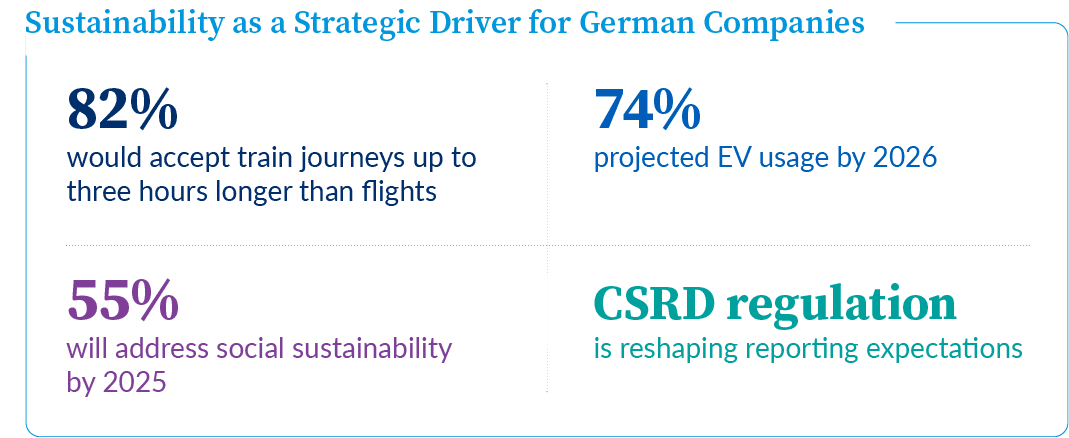
Beyond Automation: How AI Is Rewiring German Business Travel
Intro:Artificial Intelligence is no longer a distant promise. It’s beginning to shape the way German companies plan, book, and manage business travel. According to the VDR Business Travel Analysis 2025, adoption is still emerging, but momentum is undeniable. The shift is clear: AI is moving from a digital helper to a strategic partner in travel and expense management.
Rising costs, stricter regulations, and growing demands for both compliance and traveller satisfaction are pushing manual travel management to its limits. From policy checks to trend analysis, AI is stepping in to handle the heavy data work at a scale beyond human capability.
In 2024, only 32% of companies were using AI in business travel, but adoption is expected to nearly double to 63% by 2026. Larger enterprises are setting the pace: 48% have already embraced AI, compared to just 23% of SMEs.
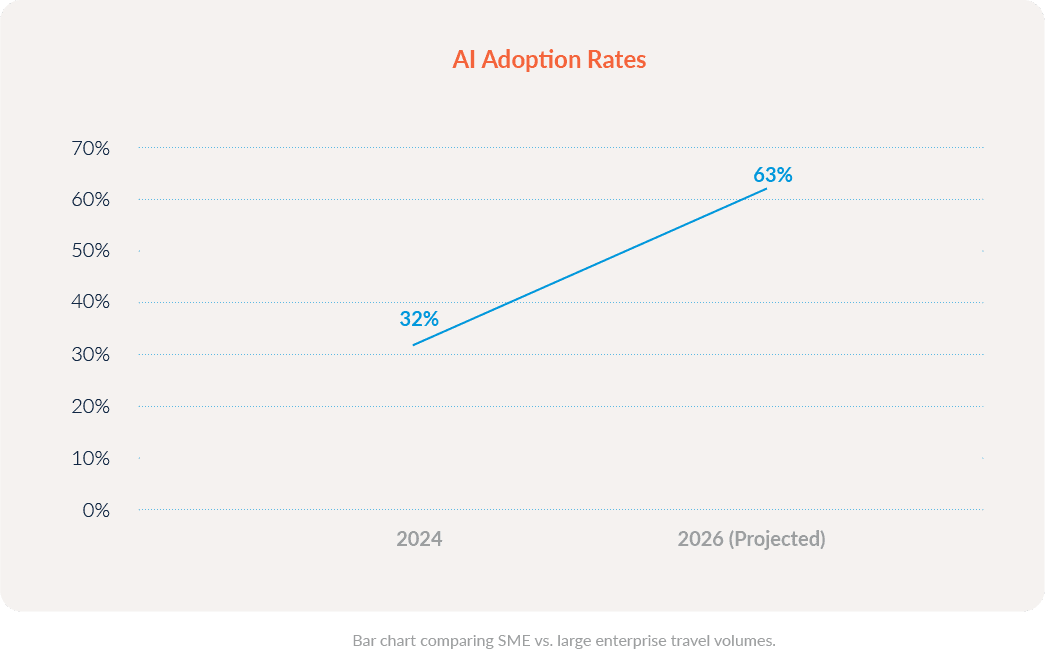
Adoption curve showing AI use in 2024 (32%), projected 2026 (63%).
Today, AI is mostly used behind the scenes: managing data, automating reports, and providing traveller communication. But tomorrow’s ambitions go further. Looking ahead, businesses aim to leverage AI for more strategic functions:
- Expense accounting and reconciliation: Emburse AI automatically extracts details from receipts, matches them to card charges and itineraries, and manages multi-currency and tax rules for faster, easier, and more accurate expense reconciliation.
- Automated bookings and itinerary adjustments: Emburse’s mobile app harnesses AI to streamline bookings, expense capture, and itinerary updates while automatically enforcing policies and rebooking when lower fares arise to ensure traveler convenience and cost savings.
- Fraud detection and compliance enforcement: Emburse AI detects anomalies, validates receipts, and ensures real-time compliance to prevent spend leakage without manual policing.
- Predictive spend forecasting: Emburse AI dashboards turn real-time spend data into predictive insights, enabling better planning and stronger rate negotiations.
Emburse Expense Intelligence gives finance teams AI-powered visibility across travel, expense, and procurement—enabling real-time decision-making, automated compliance, and predictive insights that legacy tools simply can’t deliver.
“”With AI, companies can move from reactive reconciliation to proactive planning.
VDR
This evolution goes beyond efficiency. It transforms travel from a reactive, back-office process into a predictive, intelligence-led strategy. With the right tools, finance leaders can move from analysing past costs to proactively shaping travel budgets, enforcing compliance, and enhancing employee experience in real time.
Rather than replacing human judgment, AI strengthens it, giving leaders the foresight to guide spending before it happens and make intelligent, timely decisions.

Why Safety Is Now a Strategic Imperative
In a more global, volatile, and interconnected world, business travel safety has moved far beyond the basics of booking and logistics. The VDR Business Travel Analysis 2025 makes it clear: German companies now treat traveller safety and security as a central pillar of corporate responsibility—not a side consideration.
A striking 92% of companies report that travel safety has grown in importance, with 54% saying it is “significantly” more important than in previous years. New global standards, such as ISO 31030, are guiding organisations from reactive protection toward proactive risk management. SMEs face pressures from limited digital tools and leaner budgets, but these challenges make structured safety programs even more critical to protect finances, reputation, and operations.

Across all company sizes, ensuring traveller safety is a shared responsibility. While Travel Management (51%) and Human Resources (37%) typically take the lead, effective programs require cross-functional collaboration with finance, legal, and operational teams. Companies are expanding their scope of safety to include:
Compliance policies (80%)
Formalised rules governing travel behaviour, risk mitigation, and reporting reflect the standardisation of policy enforcement across organisations.
Occupational health measures (67%)
Wellness checks, insurance requirements, and mental and physical health provisions are efforts that demonstrate employee well-being as a core component of travel planning.
Cybersecurity and information safety (68%)
Secure device access, data encryption, and protocols for handling sensitive corporate information while travelling are initiatives that underscore the increasing digital risks for mobile employees.
Emergency planning (68%)
Evacuation plans, crisis response procedures, and 24/7 travel support are among the efforts companies undertake to prepare for both predictable and unforeseen incidents.
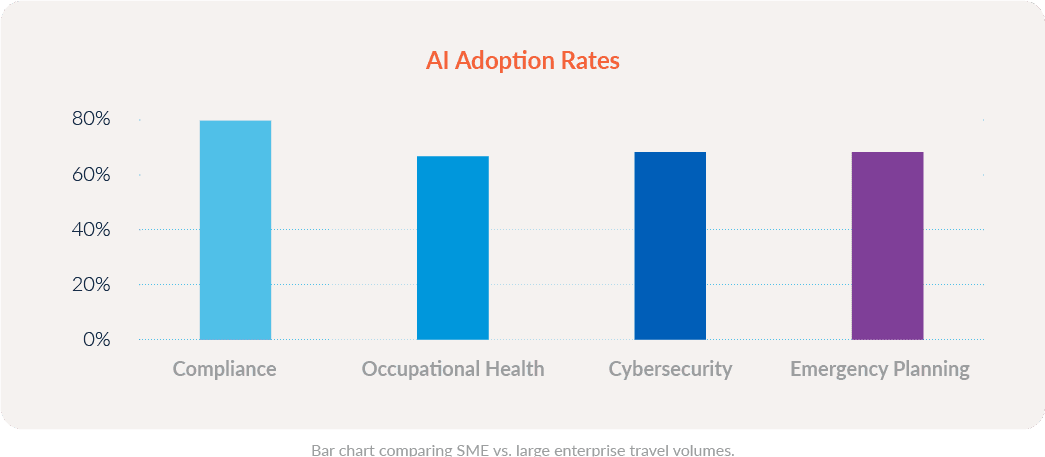
The message is clear: employee well-being is now inseparable from travel policy. Protecting travellers goes hand in hand with protecting the business—from legal liability, reputational risk, and operational disruption.
When teams operate in alignment, organisations can respond faster to incidents, maintain compliance, and provide consistent support to employees on the move.
As highlighted in the VDR report, face-to-face presence still matters for business initiation, international sales, and innovation-driven sectors. Ensuring safety is a vital step in enabling these high-value interactions.
At Emburse, we believe safety and compliance don’t have to slow teams down. With Expense Intelligence, leaders gain real-time visibility, proactive alerts, and embedded policy enforcement that help protect employees while enabling intelligent, timely decisions. Safety becomes not just a duty of care, but a competitive advantage that supports operational resilience and traveller confidence.
The €439 Question: Expense or Investment?
In 2024, the average cost of a German business trip rose to €439, a 7% increase from the year before. For CFOs and finance leaders, that figure could sound like inflationary pain. But the VDR Business Travel Analysis suggests something more important: rising unit costs reflect a strategic reorientation of business travel. Companies aren’t just spending more—they’re investing smarter.
Total business travel spend grew to €47.2 billion in 2024, despite an 8% decline in overall trip volume. This paradox reveals a shift in mindset: fewer journeys, but each one designed to deliver greater value.
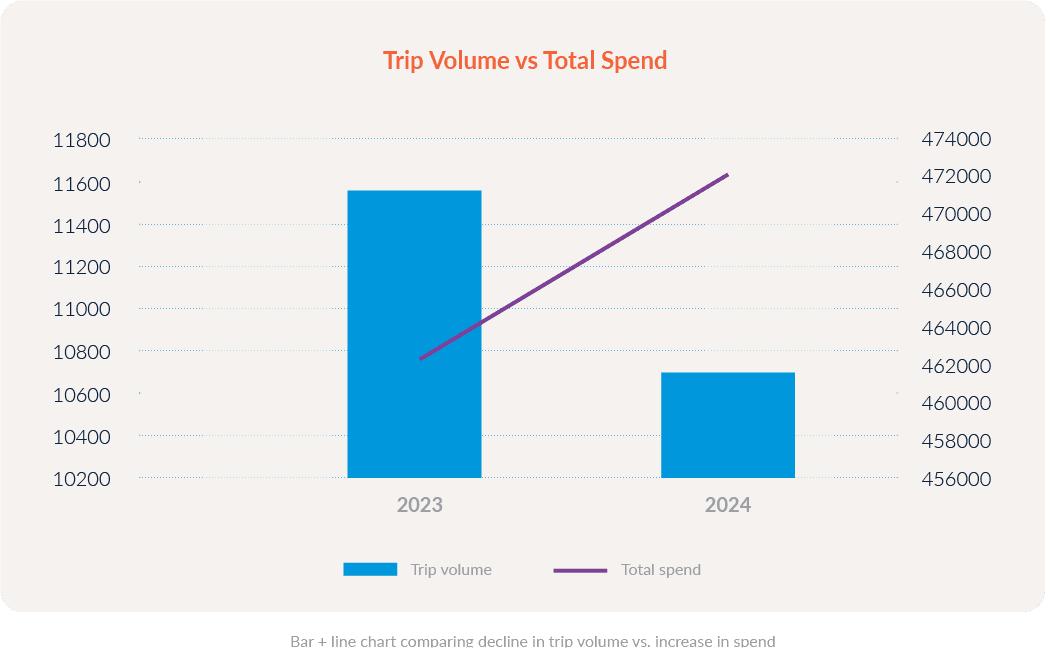
SMEs, in particular, are traveling less frequently but spending more per trip, focusing only on business-critical occasions. Large enterprises are maintaining stable volumes while also absorbing higher costs to ensure global presence.
“”In a globally connected economy, personal presence is often more than just a signal—it is a strategic success factor.
VDR
For finance leaders, the lesson is clear: travel is evolving from an operational expense to a strategic asset. The question is no longer, “How do we cut costs?” but “How do we maximise ROI per trip?”
Opportunities for CFOs include:
- Strengthening managed travel programs:Gain oversight of spend, enforce compliance, and improve RO —with Emburse travel management solutions consolidating bookings and Emburse Audit ensuring policy adherence.
- Leveraging AI and analytics for optimised spend: Use predictive insights to forecast spend, flag anomalies, and automate reconciliation. Emburse Analytics brings real-time visibility, while Audit leverages AI to catch risks early.
- Integrating sustainability into strategy: Link CO₂ budgets, compensation programs, and ESG targets directly into financial strategy. Emburse Analytics tracks emissions, and Emburse Go nudges employees toward greener travel options.
- Elevating risk and compliance management: Ensure compliance, occupational health, and cybersecurity controls reduce liability. Emburse Audit automates compliance checks, and Emburse Go helps safeguard travellers in real time.
Emburse enables this transformation through Expense Intelligence. By unifying travel, expense, and procurement data into one intelligent workflow, CFOs get real-time visibility, predictive automation, and policy control that turn business travel from a reactive cost into a proactive investment.

Not at the Destination—But Clearly on Course
The VDR Business Travel Analysis 2025 doesn’t describe a market in decline, but one undergoing purposeful transformation. Against a backdrop of rising costs, tighter ESG regulations, and shifting workforce expectations, German business travel is stabilising, reorienting, and becoming more strategic. The future will be defined not by trip volume, but by how each journey contributes to growth, resilience, and long-term sustainability.
The data points to a market in motion, one that is increasingly aligned with enterprise priorities:
Fewer trips, higher spend
This signals a focus on business-critical engagements where ROI must be measured and defended.
Global engagement on the rise
International trips now make up 35% of total volume, as firms prioritise face-to-face presence in key growth markets.
Sustainability integrated
CO₂ budgets, rail adoption, and employee well-being are no longer optional but central to corporate travel strategies.
Accelerating AI adoption
Forecast to nearly double by 2026, finance leaders increasingly leverage AI for predictive insights to forecast costs, automate compliance, and reduce waste.
Safety prioritised
92% of companies reported stronger duty-of-care requirements, reflecting employee expectations and corporate risk controls.
This isn’t a story of fewer opportunities. It’s a story of smarter opportunities. Travel in Germany is being redefined as a strategic instrument that balances cost awareness, efficiency, ESG accountability, and the human connections that drive business forward.

For finance leaders, the challenge—and the opportunity—lies in navigating this complexity with clarity. As the VDR report notes, the market is “not at its destination, but clearly on course”, or a “Landkarte voller Möglichkeiten” (map full of possibilities).
At Emburse, we believe the companies that will lead this next chapter are those that combine human presence with intelligent systems. With Expense Intelligence, leaders gain the foresight, automation, and unified control needed to turn every journey into an informed, strategic investment.
“”Landkarte voller Möglichkeiten—a map full of possibilities.
VDR

Smarter Travel. Smarter Spend. Unified Control.
German companies are rethinking the role of business travel—making every trip more purposeful, sustainable, and strategically aligned with growth. The VDR Business Travel Analysis 2025 confirms that this is not a market in decline, but one in dynamic transformation.
At Emburse, we help finance and travel leaders turn these insights into measurable outcomes.
Trusted by over 12 million professionals in 120 countries, from global enterprises and mid-sized businesses to public sector organisations and nonprofits, Expense Intelligence gives leaders:
- Real-time visibility into spend before, during, and after the trip to empower CFOs to stay ahead of budget pressures.
- Predictive insights that forecast costs and flag risks, turning uncertainty into proactive decision-making.
- Embedded compliance that protects both employees and budgets to reduce liability and out-of-policy spend.
- Sustainability tools that align travel programs with ESG goals by enabling CO₂ tracking, rail adoption, and greener itineraries.
This isn’t just expense management. It’s the infrastructure for modern finance, built on two decades of innovation and proven results to empower teams, protect resources, and unlock the true ROI of every business trip.
With Emburse, CFOs and finance leaders can move beyond cost control to deliver growth, accountability, and resilience.
Because when travel is managed with intelligence, it doesn’t just move people. It moves business forward.